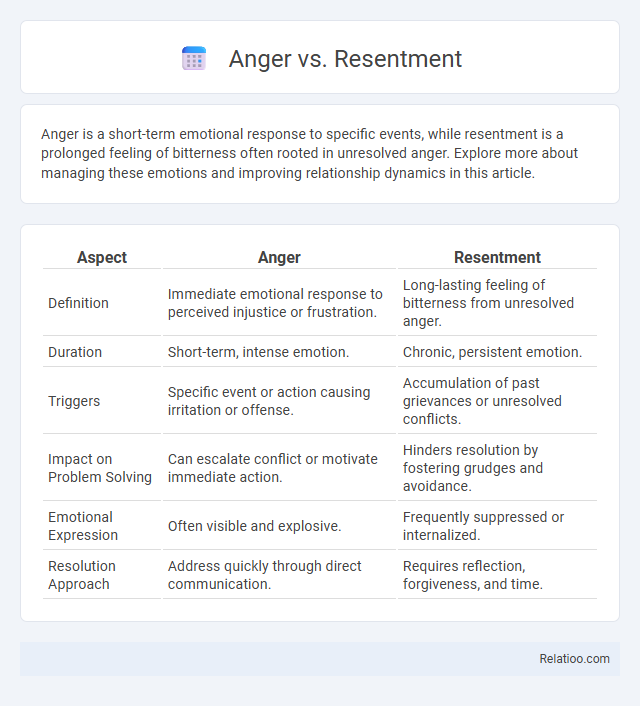Anger is a short-term emotional response to specific events, while resentment is a prolonged feeling of bitterness often rooted in unresolved anger. Explore more about managing these emotions and improving relationship dynamics in this article.
Table of Comparison
| Aspect | Anger | Resentment |
|---|---|---|
| Definition | Immediate emotional response to perceived injustice or frustration. | Long-lasting feeling of bitterness from unresolved anger. |
| Duration | Short-term, intense emotion. | Chronic, persistent emotion. |
| Triggers | Specific event or action causing irritation or offense. | Accumulation of past grievances or unresolved conflicts. |
| Impact on Problem Solving | Can escalate conflict or motivate immediate action. | Hinders resolution by fostering grudges and avoidance. |
| Emotional Expression | Often visible and explosive. | Frequently suppressed or internalized. |
| Resolution Approach | Address quickly through direct communication. | Requires reflection, forgiveness, and time. |
Understanding Anger and Resentment
Understanding anger involves recognizing it as a natural emotional response to perceived threats or injustices, often resulting in immediate physical and psychological reactions. Resentment, by contrast, is a lingering feeling of bitterness or indignation that stems from unresolved anger over prolonged periods, leading to deep-seated emotional pain. You can manage these emotions more effectively by distinguishing the transient intensity of anger from the enduring nature of resentment.
Defining Anger: Causes and Characteristics
Anger is a natural emotional response triggered by perceived threats, injustice, or frustration, often characterized by increased heart rate, muscle tension, and a heightened state of arousal. Unlike resentment, which is a persistent feeling of bitterness directed towards specific individuals or situations, anger is usually immediate and intense but short-lived. Common causes of anger include unmet expectations, feelings of disrespect, and violations of personal boundaries.
What is Resentment? Origins and Symptoms
Resentment is a complex emotional response rooted in feelings of injustice or betrayal, often stemming from perceived unfair treatment or prolonged exposure to frustration. Your experience of resentment can manifest through persistent bitterness, suppressed anger, and a lingering sense of victimization that impacts mental and physical health. Recognizing symptoms such as irritability, passive-aggressive behavior, and difficulty trusting others helps differentiate resentment from anger and guides effective emotional management strategies.
Key Differences Between Anger and Resentment
Anger is an immediate emotional response to a perceived threat or injustice, characterized by intense feelings that can be short-lived, while resentment is a lingering feeling of bitterness or indignation stemming from unresolved anger or repeated offenses. Your understanding of these distinctions helps in managing emotions more effectively, as anger often triggers a direct reaction, whereas resentment builds over time and can negatively impact mental health if left unaddressed. Recognizing the key differences enables you to address the root causes of these emotions and promote healthier emotional processing.
Emotional Triggers: Anger vs. Resentment
Emotional triggers for anger often involve immediate experiences of frustration, injustice, or threat, leading to a quick, intense response aimed at addressing or removing the cause. Resentment, by contrast, develops from prolonged feelings of unfairness or betrayal, accumulating over time when grievances remain unresolved, which results in a lingering emotional pain rather than an explosive reaction. Understanding these differences helps in managing reactions effectively by recognizing whether the emotion stems from an acute irritation or a chronic buildup of perceived wrongs.
Psychological Impact of Anger and Resentment
Anger triggers immediate physiological arousal, increasing heart rate and adrenaline, which can impair decision-making and escalate conflict if unmanaged. Resentment, a prolonged form of anger, fosters chronic stress by maintaining negative thought patterns and emotional distress over time. Both emotions contribute to psychological issues such as anxiety, depression, and impaired interpersonal relationships, but resentment's lingering nature often results in more deep-seated mental health challenges.
How Anger and Resentment Affect Relationships
Anger often triggers immediate reactions that can strain communication and escalate conflicts in relationships, leading to temporary emotional distance. Resentment, a deeper and prolonged feeling of bitterness, erodes trust and intimacy over time, causing long-lasting damage to emotional bonds. Both emotions disrupt healthy connection by fostering misunderstanding and reducing empathy between partners.
Healthy Ways to Express Anger and Resentment
Healthy ways to express anger and resentment involve acknowledging your emotions without suppressing them, using clear and direct communication to convey your feelings, and practicing mindfulness or relaxation techniques to maintain emotional balance. Setting boundaries and seeking constructive solutions can prevent resentment from festering and turning into chronic anger that harms relationships. You benefit from focusing on self-reflection and professional support when necessary to transform negative emotions into positive actions.
Long-term Effects of Unresolved Emotions
Unresolved anger can lead to chronic stress, increasing the risk of cardiovascular diseases and weakening the immune system. Resentment often fosters prolonged emotional pain, resulting in anxiety, depression, and damaged relationships that erode your overall well-being. Addressing these emotions promptly helps prevent their detrimental long-term psychological and physiological effects.
Strategies for Managing Anger and Overcoming Resentment
Effective strategies for managing anger include deep breathing exercises, cognitive restructuring to challenge negative thoughts, and physical activity to reduce stress. Overcoming resentment involves practicing forgiveness, developing empathy to understand others' perspectives, and engaging in open communication to resolve underlying conflicts. Consistent application of these techniques can promote emotional regulation and healthier interpersonal relationships.

Infographic: Anger vs Resentment
 relatioo.com
relatioo.com